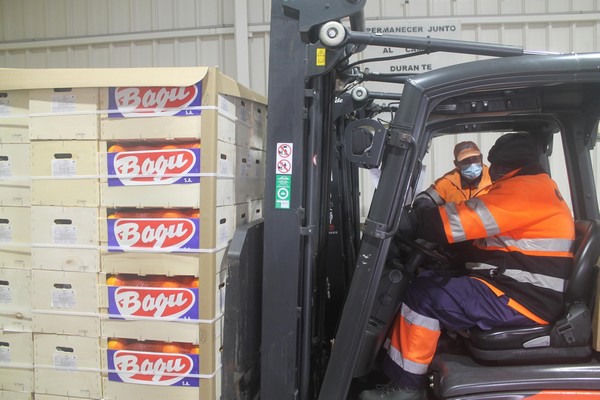The bulk of this first experimental shipment coordinated by the Citrus Management Committee (CGC) –of 9 containers of Valencia oranges– left the Port of Valencia on the MSC Sixin vessel on June 9, from the Fricasa facilities in the Port of Castellon. 2 other containers, which were also part of the same trial, had already been shipped from this enclave on May 27.
The first shipment arrived at the Port of Nhava Sheva, in Mumbai, on June 24, and the second one on June 24th.

Picture of the unloading operation at the Fricasa facilities, at the beginning of June.
Both shipments - which totaled some 246 tons - were analyzed by the Indian authorities who were able to verify that the cold chain had not been broken and that there hadn't been any issues in the cold treatment applied during the boat transport to India. The cargo also passed the phytosanitary, quality, and other more specific controls, so authorities allowed dispatching both consignments.
The definitive opening of this market - in viable conditions to export Spanish oranges - is now pending the approval of the new quarantine plan, its notification to the World Trade Organization (WTO), and the publication of the new protocol in the official gazette. Thus, operators will probably be enabled to carry out the necessary cold treatment in transit in a few months.
Picture of the unloading operation at the Fricasa facilities, at the beginning of June.
The current protocol, which would be modified, requires that the cold treatment required to guarantee the non-presence of Ceratitis capitata in citrus fruits must be carried out before the fruit is shipped. Citrus fruits must be submitted, at the facilities of the port of departure, to temperatures between 0 and 1.1 degrees for between 10 and 12 days before they are shipped. Then the fruit is shipped and takes 21-30 days to reach the destination port.
With the new conditions, which have now proven their effectiveness in guaranteeing the absence of the aforementioned pest and conform to international standards, the oranges are subjected to cold treatment for more days - up to 20 - but at a temperature that is somewhat higher –3 degrees or less– as they are being transported to their destination.
The companies that have participated in this expedition led by the CGC were: Bagu, Bollo International Fruits, Cañamás Hermanos, Fontestad Citrus, Frutas Tono, Fruxeresa, García Ballester, Juan Motilla, Martinavarro, and Vicente Giner.
For more information:

